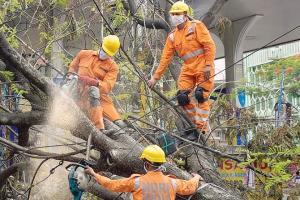I must admit it was very tough. We had no other option but to herd people out of villages to the cyclone shelters and they were not in a position at that moment to observe safety precautions like social distancing

NDRF personnel work to clear an uprooted tree from a road, in Kolkata, on Tuesday. Pic/PTI
Cyclone Amphan, which tormented much of West Bengal and parts of Odisha, came across as a timely lesson for upgradation of infrastructure in rural areas and underscored the need for states to accord top priority to disaster governance, NDRF chief SN Pradhan said. Pradhan said extreme natural events are going to be more frequent now with the changing climate, and the only way to save more lives and reduce damage to property is through disaster-resilient infrastructure, especially in the coastal belts.
ADVERTISEMENT
Super cyclone Amphan was a timely lesson that we cannot take chances anymore. Villages have to make cyclone- resistant structures, even if they are hutments for the poor, especially in coastal areas. Housing schemes like the Pradhan Mantri Awas Yojana should incorporate cyclone-resistant designs. Another serious requirement is underground electrification in rural and coastal locations. I know it might not be cost effective but no technology is so to start with; you have to push for it, the director-general of the National Disaster Response Force told PTI in an interview. A total of 86 people died and lakhs were rendered homeless as the cyclone cut a swathe through half-a-dozen districts of West Bengal, including state capital Kolkata, on May 20.
The fierce winds blew away shanties, flattened kutcha houses and uprooted thousands of trees and electric poles. Amphan also affected nearly 45 lakh people and damaged a large number of houses in the coastal districts of neighbouring Odisha. Pradhan said road clearance is over 90 per cent complete in most of the severely-affected districts of West Bengal, where 38 NDRF teams have been deployed, including 19 alone in Kolkata. Inter-village and nearest-town connectivity have been largely restored and even in South 24 Parganas, which was among the hardest hit districts, a lot of traffic is now on the roads. But, rebuilding kutcha houses in the rural areas will take time, he said.
The top NDRF official said many people have now started going back from cyclone shelters and repairing their own houses. Pradhan said more NDRF teams have been moved from the rural districts to Kolkata, where protests over power and water supply disruption have been raging on in several areas for the last few days. Complete normalcy in the state is still a day or two away, he said. The director general said the COVID-19 pandemic compounded the challenge of moving people to safety and saving lives as the cyclone hurtled towards West Bengal and Odisha. I must admit it was very tough. We had no other option but to herd people out of villages to the cyclone shelters and they were not in a position at that moment to observe safety precautions like social distancing.
However, what we did was the next best thing we could do and that is to sanitise the shelters, separate people into small groups, each keeping a safe distance from the other and make them wear masks. Our first aim was to take the vulnerable to safety and then follow COVID protocols, Pradhan said. On reports of an NDRF personnel testing positive for COVID-19, he said its a one-off case and should not be a cause for concern, as the federal contingency force has put in place strict safety protocols since January.
Pradhan said with cyclones becoming more regular, even in summers, its high time that states turn their attention to disaster governance. You cannot compromise on disaster governance at any cost. State governments must treat it as a rule and not an exception. If a state is good in disaster governance, it will be good in general governance as well, and not the other way round. It is imperative that their crisis management teams are fully trained and prepared before a disaster like cyclone strikes, the senior official said.
Catch up on all the latest Mumbai news, crime news, current affairs, and a complete guide from food to things to do and events across Mumbai. Also download the new mid-day Android and iOS apps to get latest updates.
Mid-Day is now on Telegram. Click here to join our channel (@middayinfomedialtd) and stay updated with the latest news
 Subscribe today by clicking the link and stay updated with the latest news!" Click here!
Subscribe today by clicking the link and stay updated with the latest news!" Click here!






